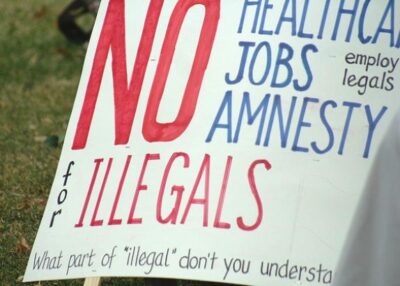Immigration at the Border

Kris Kobach, a Romney Immigration Advisor, Puts Number on Self-Deportation Plan
A recent Salon.com article quotes long-time immigration restrictionist Kris Kobach putting a figure on his self-deportation policy for the first time. “If we had a true nationwide policy of self-deportation,” Kobach said, “I believe we would see our illegal alien population cut in half at a minimum very quickly.” Salon.com did the math, finding that “with an estimated 11 million undocumented residents in the country, Kobach is hoping to force 5.5 million people to leave the country by 2016.” Kobach insists, however, that he does not want “to do it at gunpoint.” Instead, he said undocumented residents “should go home on their own volition, under their own will, pick their own day, get their things in order and leave. That’s a more humane way.” Read More

Kris Kobach, a Romney Immigration Advisor, Puts Number on Self-Deportation Plan
A recent Salon.com article quotes long-time immigration restrictionist Kris Kobach putting a figure on his self-deportation policy for the first time. “If we had a true nationwide policy of self-deportation,” Kobach said, “I believe we would see our illegal alien population cut in half at a minimum very quickly.” Salon.com did the math, finding that “with an estimated 11 million undocumented residents in the country, Kobach is hoping to force 5.5 million people to leave the country by 2016.” Kobach insists, however, that he does not want “to do it at gunpoint.” Instead, he said undocumented residents “should go home on their own volition, under their own will, pick their own day, get their things in order and leave. That’s a more humane way.” Read More

Authority of U.S. Customs and Border Protection Agents: An Overview
As federal officers, U.S. Customs and Border Patrol agents may only exercise the authority granted under federal statutes and regulations. This fact sheet provides a snapshot of search, interrogation, and arrest powers currently authorized under the law. Read More

What the President’s 2013 Budget Means for the Administration’s Immigration Priorities
This month, President Obama released his FY2013 budget proposal, estimating $3.8 trillion in total spending in 2013. This budget proposal signals the beginning of the annual federal budget process. Congressional budget and appropriations committees will now spend months deliberating over the appropriations bills, which are unlikely to look anything like the president’s budget proposal. However, the president’s budget request does provide a window into the administration’s immigration priorities and plans. Read More

New Mexico Governor Fails to Repeal State Driver’s License Law Yet Again
Yesterday, the New Mexico Legislature ended its 2012 session, leaving intact the 2003 state law that allows driver’s licenses to be issued to individuals regardless of immigration status. This marks the third unsuccessful attempt by Republican Governor Susana Martinez to repeal the state’s driver’s license law. HB103, the bill backed by Martinez, passed the House earlier this month but failed to make it through the Senate. An alternative Senate bill, SB235, which would have tightened residency requirements but not repealed the 2003 law, passed the Senate. Governor Martinez, however, vowed to veto that Senate bill. New Mexico and Washington are the only states that issue driver’s licenses regardless of immigration status (Utah issues a driving certificate that can’t be used for identification). Read More

At Supreme Court, Arizona Gets Help from the Usual Suspects
Following the filing last week of Arizona’s brief defending SB 1070, the Supreme Court has received a barrage of briefs supporting the notorious immigration law from a none-too-surprising array of suspects. As might be expected, the arguments range from the predictable (that the Obama Administration fails to enforce the immigration laws) to the provocative (that states can carry out all immigration functions short of deportation) to the preposterous (that the Constitution allows Arizona to wage war against an “invasion” of immigrants). Of course, while neither Arizona nor their lawyers can be held responsible for the arguments of outside organizations, the briefs still offer a revealing look at the identities and motivations of SB 1070’s most ardent supporters. Read More

Q&A Guide to State Immigration Laws
What You Need to Know if Your State is Considering Anti-immigrant Legislation Updated 2012 - In April 2010, Arizona governor Jan Brewer signed the “Support Our Law Enforcement and Safe Neighborhoods Act,” or, as it is commonly known, SB1070. At the time of its passage, Arizona’s immigration law surpassed all previous state immigration-control efforts. While much of the law has been enjoined by the courts, its passage inspired legislators in other states to pass similar legislation. Since SB1070 passed, 36 other states have attempted to pass harsh immigration-control laws. Of those, 31 states have rejected or refused to advance their bills. However, five states—Utah, Indiana, South Carolina, Georgia, and Alabama—have passed laws that mirror or go beyond the Arizona law. It is likely that additional states will attempt to pass similar anti-immigrant legislation during the 2012 legislative session. SB1070 and other immigration-related state legislation represent, among other things, a growing frustration with our broken immigration system. The courts will decide the constitutionality of the various laws, and time will answer many questions about their impact. In the short term, much evidence suggests that an enforcement-only strategy—whether attempted at the federal or state level—will not solve the root causes of unauthorized immigration. Read More

ICE’s New Public Advocate Office a Step in the Right Direction
Immigration and Customs Enforcement (ICE) recently announced creation of its first Public Advocate’s office, designed to serve as a point of contact for people trying to cut through the bureaucracy to get questions answered and concerns heard. While immigration hardliner Rep. Lamar Smith was quick to call the new office a “lobbying firm for illegal immigrants,” the actual job description is more like an extension of current public engagement functions, but with the possibility of more specific intervention on individual cases. Read More

Report by Maryland State Panel Details Positive Approach to Immigration
A new report from the Commission to Study the Impact of Immigrants in Maryland concludes that immigrants bring a plethora of economic, social, and cultural contributions to the state of Maryland. The commission, which was created by the Maryland General Assembly, also warns against attempts to deal with unauthorized immigration through enforcement-only policies that needlessly sow fear and distrust in immigrant communities. Rather, the commission admonishes, “Maryland must remain welcoming to immigrants, and the state and its local jurisdictions should further strengthen its efforts to integrate immigrants into the economy and the community.” Read More

Tuition Equity Bills Continue to Build Momentum in State Legislatures
By ALVIN MELATHE AND SUMAN RAGHUNATHAN, PROGRESSIVE STATES NETWORK While federal efforts to fix our broken immigration system remain on hold, support is growing among state lawmakers for common-sense, proactive approaches that welcome immigrants and expand opportunity for all, both immigrant and native-born. Across the country, a growing and diverse number of forward-thinking state legislators are turning away from unconstitutional, divisive, and economically devastating approaches taken by states such as Arizona and Alabama. Instead they are advancing inventive policies that make economic sense for states’ bottom lines and uphold their reputations. One such approach, tuition equity, continues to gain political and popular support and build momentum in statehouses across the country. Read More
Make a contribution
Make a direct impact on the lives of immigrants.
